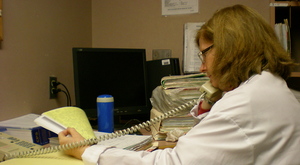



Note-taking and Dictation
Both note-taking and dictation are important for good record keeping, and good record keeping is important for good patient care. The CMPA has a number of resources on note-taking and documentation.
Though many doctors are moving towards using an electronic medical record, however, the principles for good record keeping apply in all medical records. First, it is better to do note taking and dictation at the time of the patient encounter, it is more accurate, more comprehensive and takes less time. Many of us avoid doing this and it usually takes longer in the end!
Sometimes learners are discouraged from taking notes during an interview, for fear that it may distract them or appear unprofessional. In actual fact it is a very good practice and shows that you care and are paying attention. Remember to maintain eye contact as much as you can and confirm your understanding of what the patient and family members have said.
Dictating notes and discharge summaries takes practice. Some of the following tips can make dictating easier:

dictate as soon as you can after the encounter or discharge
ORGANIZE your thoughts and structure your note before you start
identify yourself, document date of dictation, who will receive copies
pace yourself so that your speech is clear
spell clearly patient names and unusual words
use the "pause" button when needed, long stretches dead air are annoying for a transcriptionist
punctuate- state when you want a new heading/subtitle, new paragraph, use BOLD etc..
always state "end dictation" when you are done
 Previous
Previous